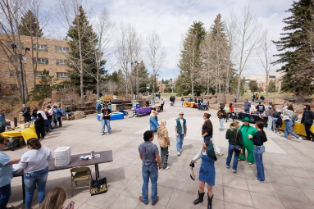The Wallop Civic Engagement K-12 Curriculum Project developed as a partnership with the College of Education’s Trustees Education Initiative designed to provide a library of virtual multimedia resources for K-12 social studies teachers for their classrooms. The catalog of materials includes content materials organized by different content disciplines including Social Studies and English Language Arts as well as specific projects such as the WDE Civics Ed Center, Wyoming Youth Resilience Project, Wyoming Museums Project, a Health Education Catalog, and other materials.
Social Studies Catalog. The social studies catalog provides short courses whose content areas line up with one or more of the six Wyoming Social Studies Content Standards:
- Citizenship (Government and Democracy)
- Culture and Cultural Diversity
- Production, Distribution, and Consumption (Economics)
- Time, Continuity, and Change (History)
- People, Places, and Environments (Geography)
- Technology, Literacy and Global Connections
English Language Arts Catalog. The English language arts catalog provides short courses whose content areas focus on themes of 1) culture and people of the West, 2) identity, community, and rural life, and 3) rights, liberties, and civic responsibilities. Content areas line up with Wyoming English Language Arts Anchor Standards:
- Reading
- Writing
- Speaking and Listening
- Language
All of these materials are free for teachers and the public. Each course module in the social studies and English language arts catalogs consists of a single video and supplementary handout/teaching guide that includes discussion questions, sample exercises, and links to additional open access materials.
The Wallop K-12 Curriculum Project represents a special commitment to reach out to the Wyoming educational community. We received a grant from the National Endowment for the Humanities (NEH) "Integrating the Humanities Across Civics Education in Wyoming" that allowed us to expand the K-12 project across 2021-24. This project was just one of a few of the projects nationwide selected for the prestigious Humanities Initiatives at Colleges and Universities Program at the NEH. The grant allowed us to expand our existing social studies K-12 curriculum catalog, to create the English language arts catalog, and to host summer teacher professional development workshops. Special thanks to The Tucker Foundation, Rocky Mountain Power Foundation, and our generous supporters for making this project possible. The K-12 Curriculum virtual catalog is available at https://civic.catalog.instructure.com/.
The K-12 catalog includes 130+ content modules which line up with various social studies and English language arts content and performance standards. Topics range from a discussion of Wyoming government and politics, religious freedom in the new republic, to current topics such as Bitcoin and U.S.-China relations. These resources are unique because each video presentation includes a teacher resource guide showing how the presentation addresses one or more of Wyoming’s standards and provides suggested discussion questions and/or class activities.
WDE CIVICS EDUCATION CENTER
The Civics Ed Center was created in collaboration with the Wyoming Department of Education (WDE). The center is the result of the work of a WDE subcabinet of education stakeholders who were appointed from across Wyoming to represent the interest of students, parents, school districts, and communities. The readily available resources provided in the Civics Ed Center are intended to support the work being done by districts, schools, and community organizations. The resources provided have been aligned with Wyoming Content and Performance Standards focused on Civics and the State Board of Education’s Profile of a Graduate. The Civics Ed Center is located within the Wallop Civic Engagement Program within UW’s WyoLearn Catalog. This resource can be accessed at WDE Civics Ed Center - Malcolm Wallop Civic Engagement Project. Additional information about the project is available on the WDE website at Civics Ed Center - Wyoming Department Of Education.
Educator Testimonial
K-12 Catalog Course Examples
A Crash Course in Wyoming Politics: Culture and Participation
Dr. Jason McConnell-Assistant Professor, School of Politics, Public Affairs, and International Studies, University of Wyoming
The “Pristine Myth" & Its Influence Today
Fake News! Defining Misinformation
Bitcoin
K-12 Curriculum Project Impacts
Visit the Virtual Library on WyoLearn here.
Ready to check it out?





